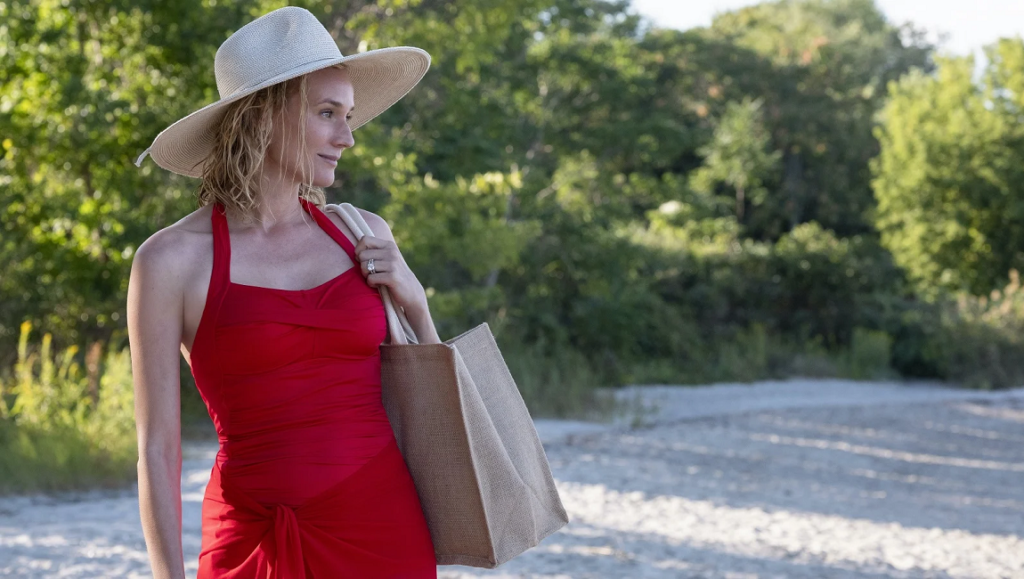Out of the Blue feels like a bizarre cross between Murder, She Wrote and Cassandra’s Dream, punched up with a healthy dose of LaBute’s patented woman-hating toxicity.
It’s been nearly a decade since playwright/filmmaker Neil LaBute has directed a feature based on his own material, and it isn’t difficult to understand why. The once ubiquitous art house provocateur thrived in the mid-’90s to early aughts by fashioning low-budget gabfests that trafficked in casual misogyny and toxic masculinity, his blunt force dialogue and overall bad boy attitude proving catnip for actors and actresses looking to take a walk on the wild side. While there’s no denying that the man knows how to craft a brutal comeback, his works were problematic for reasons that seemed unintended, takedowns of narcissistic and deplorable males whose messaging was clouded due to the fact that all of the female characters were painted as one-dimensional saints or manipulative shrews. So much time was spent developing his male protagonists that the resulting films seemed to be a ringing endorsement of their actions, the only compelling thing on screen at any given moment. It didn’t help that LaBute’s material was never as shocking as he thought it was, often coming across as the annoying rantings of a fragile little boy who got stood up for prom one too many times. His specific type of provocations have a shelf life, and if anything, the #MeToo movement should have put the final nail in the coffin of LaBute’s once promising career.
But here we are in 2022, and the enfant terrible is back with Out of the Blue, a sun-drenched neo-noir that feels as backward and dated as anything else in his filmography. Honestly, it is hard to believe that it has taken LaBute this long to dip his toes into this specific subgenre, what with its emphasis on manipulative women doing terrible things to stupid men; if anything, you’d think this lane would be alluring to LaBute, a way for his baser instincts to feel borderline organic. Alas, the femme fatale at the heart of Out of the Blue, Marilyn Chambers (Diane Kruger), is cunning in ways that seem to signal someone suffering from severe head trauma, while her target, Connor (Ray Nicholson), is so otherworldly dumb that it’s a mystery how he is able to tie his shoes every morning. Both live in the quaint, picturesque town of Twin Oaks, Rhode Island, where every view of the ocean is Instagram-worthy and every library is a fuck den. Connor has just gotten out of prison for reasons unknown and has taken a job at the local book repository because it’s the only place that would hire him and is seemingly one of two employers in the entire town. One morning while running — boy, does this guy like to run, and talk about running — he stumbles across the sultry Marilyn as she emerges from the water in a stunning red bathing suit. Unable to comprehend symbolism, Connor begins a torrid love affair with Marilyn after discovering that her husband beats her, which frankly seems like a boner-killer but helps to excuse their questionable actions. It doesn’t take long before Marilyn asks her new paramour to kill her abusive partner, and things naturally spiral out of control from there. The Postman Always Rings Twice even gets name-checked a number of times in Out of the Blue, which, if nothing else, signals the type of ego we’re dealing with here.
In reality, the film looks and feels like a cross between a particularly saucy episode of Murder, She Wrote and Woody Allen’s middling genre exercise Cassandra’s Dream. Title cards keep alerting us to how much time has passed, but not really, opting for cutesy inserts like, “Some Days After,” proving about as useful as it does charming. The biggest issue is that none of the characters here are the least bit compelling, their bad behavior seeming less like a byproduct of their stunted and poisoned morality than simply the machinations of a derivative script that jerks them around because that’s what noirs are supposed to do, right? None of the twists are the least bit surprising, which probably explains why the cast seems borderline comatose, save for Hank Azaria, who pops up as Connor’s parole officer and is so electrifying in his limited screen time that it once again raises the question of why he still hasn’t gotten the meaningful leading roles he so clearly deserves. Kruger frankly looks distracted, while Nicholson proves that dad Jack gave him none of his raw charisma or screen presence. To add insult to injury, LaBute includes a completely superfluous subplot about a young woman who works at the library and harbors a crush on Connor. When she finally admits her feelings and he turns her down, she responds by completely cutting him out of her life, going so far as to outright snub him at a restaurant days later. “Every woman wants Connor’s dick, but why they all gotta be bitches?” LaBute bravely asks, when a more appropriate question would be, “Why did you name your lead character after a famous 1970s porn star?” That is undoubtedly between LaBute and his therapist, and the resulting session would undoubtedly offer more fascinating viewing than anything in Out of the Blue.


Comments are closed.